Pam Lecky's Blog, page 6
June 10, 2024
Frances – Tudor Countess: New Release from Tony Riches
Today, I am delighted to host Tony Riches and to spotlight his fabulous new release – Frances – Tudor Countess, Book five in his Elizabethan Series.
“A thrilling portrait of a remarkable woman who witnessed the key events
of Elizabethan England.”
Based on extensive research, original letters and records of the Elizabethan Court, this new account explores the life of Frances Walsingham, the only surviving child of Queen Elizabeth’s ‘spymaster’ Sir Francis Walsingham. Better educated than most men, her father arranges her marriage to warrior poet Sir Philip Sidney. After Philip is killed in battle, Frances becomes Countess of Essex, and is banished from court after her husband Sir Robert Devereaux’s rebellion against the queen. Can she marry for love, if it means turning her back on her faith and all she knows?
The story which began with the Tudor trilogy follows Frances, Countess of Essex and Clanricarde, from her first days at the Elizabethan Court to the end of the Tudor dynasty and the rise of the Stuarts.

 https://www.amazon.co.uk/dp/B0D1YQYL8G
https://www.amazon.co.uk/dp/B0D1YQYL8G
 https://www.amazon.com/dp/B0D1YQYL8G
https://www.amazon.com/dp/B0D1YQYL8G
#Elizabethan #Tudors #HistoricalFiction
Author Bio

Tony Riches is a full-time UK author of Tudor historical fiction. He lives with his wife in Pembrokeshire, West Wales and is a specialist in the lives of the early Tudors. As well as his new Elizabethan series, Tony’s historical fiction novels include the best-selling Tudor trilogy and his Brandon trilogy, (about Charles Brandon and his wives). For more information about Tony’s books please visit his website tonyriches.com and his blog, The Writing Desk and find him on Facebook, Instagram, Bluesky and Twitter @tonyriches.
June 4, 2024
The Lost Women of Mill Street: The Coffee Pot Book Club Tour
Today, I am delighted to host Kinley Bryan for her book blog tour for The Lost Women of Mill Street.
You can follow the full tour here:
The Lost Women of Mill Street by Kinley Bryan1864: As Sherman’s army marches toward Atlanta, a cotton mill commandeered by the Confederacy lies in its path. Inside the mill, Clara Douglas weaves cloth and watches over her sister Kitty, waiting for the day her fiancé returns from the West.
When Sherman’s troops destroy the mill, Clara’s plans to start a new life in Nebraska are threatened. Branded as traitors by the Federals, Clara, Kitty, and countless others are exiled to a desolate refugee prison hundreds of miles from home.
Cut off from all they’ve ever known, Clara clings to hope while grappling with doubts about her fiancé’s ambitions and the unsettling truths surrounding his absence. As the days pass, the sisters find themselves thrust onto the foreign streets of Cincinnati, a city teeming with uncertainty and hostility. She must summon reserves of courage, ingenuity, and strength she didn’t know she had if they are to survive in an unfamiliar, unwelcoming land.
Inspired by true events of the Civil War, The Lost Women of Mill Street is a vividly drawn novel about the bonds of sisterhood, the strength of women, and the repercussions of war on individual lives.

Buy Link:
Universal Buy Link: https://books2read.com/lostwomenofmillstreet
Author Bio:
Kinley Bryan’s debut novel, Sisters of the Sweetwater Fury, inspired by the Great Lakes Storm of 1913 and her own family history, won the 2022 Publishers Weekly Selfies Award for adult fiction. An Ohio native, she lives in South Carolina with her husband and three children. The Lost Women of Mill Street is her second novel.
Author Links:
Website: https://kinleybryan.com/
Twitter: https://twitter.com/kinleybauthor
Facebook: https://www.facebook.com/KinleyBryanWrites
Instagram: https://www.instagram.com/kinleybryanauthor/
Book Bub: https://www.bookbub.com/profile/kinley-bryan
Amazon Author Page: https://www.amazon.com/stores/Kinley-Bryan/author/B09J5GWDLX
Goodreads: https://www.goodreads.com/author/show/21892910.Kinley_Bryan
April 26, 2024
A Splendid Defiance by Stella Riley: The Coffee Pot Book Club Blog Tour
Today, I am delighted to host Stella Riley for the book blog tour for A Splendid Defiance, part of the Roundheads & Cavaliers Series. Stella has kindly included a excerpt for you to read (please see below).
Special Tour Price: Ebook £1.95 / US $1.95 (and equivalent) for the duration of the tour!
You can follow the full tour here: https://thecoffeepotbookclub.blogspot.com/2024/03/blog-tour-a-splendid-defiance-by-stella-riley.html
A Splendid Defiance by Stella Riley
Audiobook performed by Alex Wyndham
For two years England has been in the grip of Civil War. In Banbury, Oxfordshire, the Cavaliers hold the Castle, the Roundheads want it back and the town is full of zealous Puritans.
Consequently, the gulf between Captain Justin Ambrose and Abigail Radford, the sister of a fanatically religious shopkeeper, ought to be unbridgeable.
The key to both the fate of the Castle and that of Justin and Abigail lies in defiance. But will it be enough?
A Splendid Defiance is a dramatic and enchanting story of forbidden love, set against the turmoil and anguish of the English Civil War.
Buy Link:
Universal Buy Link: https://books2read.com/u/bPzVNd
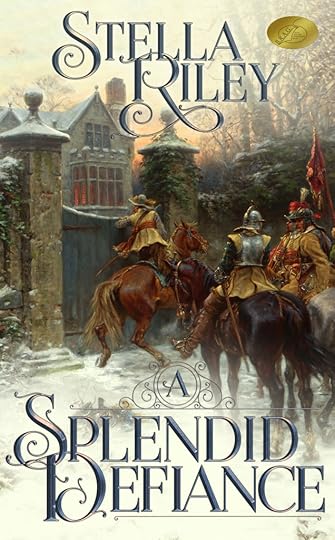 Excerpt from A Spendid Defiance:News from the North
Excerpt from A Spendid Defiance:News from the NorthWaving Cornet Anderson back into his seat, Sir Willliam said, ‘You’ve been at York with the Prince?’
‘Yes, sir.’ The boy squared his shoulders. ‘He’ll be marching south again soon. There – there’s nothing else to do. York is lost.’
Incredulity and incomprehension registered in varying degrees on the faces before him. Then Lieutenant-Colonel Greene said, ‘Lost? Irretrievably?’
‘Yes, sir.’
‘How? Didn’t Rupert get there in time?’
‘Oh yes, sir. He did – and he relieved the city,’ said Cornet Anderson quickly. ‘He made one of his fast marches round to the north and we got to York while the enemy must have thought us still at Knaresborough. Only…’
‘Yes?’ prompted Sir William.
The boy stared down at his hands.
‘Well, the rebels had us heavily outnumbered but everyone was saying that they wouldn’t attack because of the York garrison.’
‘And did they? Were you taken by surprise?’
‘No – at least, not then. But the Prince said that we must engage them early next day and my Lord Goring went into York to tell Lord Newcastle to bring his men out to rendezvous with us. Only they were late and the whole morning went by and the Prince was fretting at the delay.’
‘I’ll wager he was,’ said Justin Ambrose grimly. ‘Cursing all creation, was he?’
‘I don’t know, sir. He marched us to Long Marston and deployed us for battle before the York men came up. But by that time there was a storm brewing so His Highness said we could stand down and get something to eat. It must have been nearly seven o’clock and, after all the delay and everything, it seemed he’d decided not to attack … and it didn’t look as if the enemy would because they’d been manoeuvring as if they expected us to strike south again.’ He paused and his hands suddenly tightened on each other. ‘And then all hell broke loose. They attacked and the storm came all at once. The Prince was riding up and down the lines through the rain like a man possessed. It wasn’t even his own horse.’ He stopped again and then said wearily, ‘It was horrible. The Prince’s cavalry just broke and scattered. And Lord Newcastle’s men kept refusing quarter until – until they were all lying there in the mud.’
This time the silence seemed to close around each one of them like a fist.
‘So York could not be held and the North is lost,’ said the Lieutenant-Colonel at last, voicing all their thoughts. ‘What is Prince Rupert doing?’
‘Rallying the men, sir. Lord Newcastle,’ added the boy on a perceptible note of contempt, ‘is taking ship for France.’
‘And what of Rupert himself?’ asked Justin. ‘It’s his first real defeat. How has he taken it?’
‘It’s hard to say,’ came the slow response. ‘But they killed his dog, you know … and that must have been near as bad as everything else.’
Author Bio:
Winner of four gold medals for historical romance and sixteen Book Readers’ Appreciation Medallions, Stella Riley lives in the beautiful medieval town of Sandwich in Kent.

She is fascinated by the English Civil Wars and has written six books set in that period. These, like the 7 book Rockliffe series, the Brandon Brothers trilogy and, most recently The Shadow Earl, are all available in audio, performed by Alex Wyndham.
Stella enjoys travel, reading, theatre, Baroque music and playing the harpsichord. She also has a fondness for men with long hair – hence her 17th and 18th century heroes.
Author Links:
Website: https://stellarileybooks.co.uk
Twitter: https://twitter.com/RileyStella
Facebook: https://www.facebook.com/stellariley.books
Instagram: https://www.instagram.com/stellarileybooks/
Pinterest: https://www.pinterest.co.uk/riley9631/stella-riley-books/
Book Bub: https://www.bookbub.com/authors/stella-riley
Amazon Author Page: https://www.amazon.co.uk/Stella-Riley/e/B0034PB7UU/
Goodreads: https://www.goodreads.com/book/show/40487661-a-splendid-defiance
March 8, 2024
West of Santillane by Brook Allen: Book Spotlight
Today, is publication day for Brook Allen’s latest release, West of Santillane. Congratulations Brook! And isn’t that cover just gorgeous?
I was lucky enough to read an ARC copy of this novel and can highly recommend it. I have to admit I knew next to nothing about early American history and I found this book fascinating. To celebrate the release I am posting a recent interview with Brook, below.
West of Santillane by Brook Allen
Desperate to escape a mundane future as a Virginia planter’s wife, Julia Hancock seizes her chance for adventure when she wins the heart of American hero William Clark. Though her husband is the famed explorer, Julia embarks on her own thrilling and perilous journey of self-discovery.
With her gaze ever westward, Julia possesses a hunger for knowledge and a passion for helping others. She falls in love with Will’s strength and generous manner, but, like her parents, he is a slave owner, and Julia harbors strong opinions against slavery. Still, her love for Will wins out, though he remains unaware of her beliefs.
Julia finds St. Louis to be a rough town with few of the luxuries to which she is accustomed, harboring scandalous politicians and miscreants of all types. As her husband and his best friend, Meriwether Lewis, work to establish an American government and plan to publish their highly anticipated memoirs, Julia struggles to assume the roles of both wife and mother. She is also drawn into the plight of an Indian family desperate to return to their own lands and becomes an advocate for Will’s enslaved.
When political rivals cause trouble, Julia’s clandestine aid to the Indians and enslaved of St. Louis draws unwanted attention, placing her at odds with her husband. Danger cloaks itself in far too many ways, leading her to embrace the courage to save herself and others through a challenge of forgiveness that will either restore the love she shares with Will or end it forever.
Amazon Link: https://amazon.com/dp/B0CVD66J2J
Author InterviewBrook, you are very welcome onto my blog. Please introduce yourself.
Hello, readers! I’m Brook Allen and I have a passion for history. My Antonius Trilogy is a detailed account of the life of Marcus Antonius—Marc Antony, which I worked on for fifteen years. I’m a member of the Historical Novel Society and I attend conferences as often as possible to study craft and meet fellow authors.
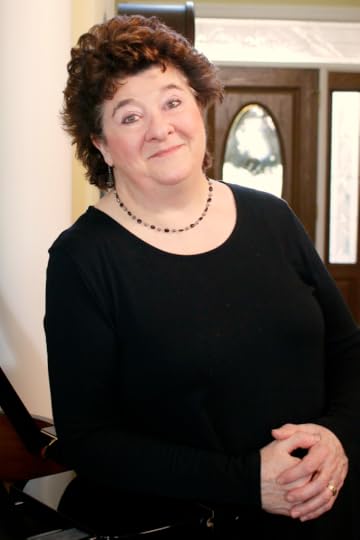 Brook Allen
Brook AllenIn 2019, my debut novel Son of Rome won the Coffee Pot Book Club Book of the Year Award. In 2020, it was awarded a silver medal in the international Reader’s Favorite Book Reviewers Book Awards and also won First Place in the prestigious Chaucer Division in the Chanticleer International Book Awards, 2020.
My newest project, West of Santillane spotlights U.S. history. It’s the story of Julia Hancock, who married famed explorer, William Clark. Each character was researched throughout southwest Virginia and into Kentucky, Missouri, North Dakota, Montana, and Idaho. It launches in March of 2024.
Though I graduated from Asbury University with a B.A. in Music Education, I’ve always loved writing. I teach full-time as a Music Educator in a rural public-school district near Roanoke, Virginia. My personal interests include travel, cycling, hiking in the woods, reading, and spending downtime with her husband and big, black dog, Jak. We three live in the heart of southwest Virginia in the scenic Blue Ridge Mountains.
Which genre do you write in and what draws you to it?
I’ve always loved historical fiction. There’s something about old things—antiques, historical sites, even cemeteries—that lure me into a curious passion to learn about the people who may have lived in particular places at particular times. I tell people whenever I’m doing an author talk that history is never boring. In fact, I tend to believe that if you take history as it is, there’s more drama and excitement there than Hollywood should bother adding!
Are you an avid reader? Do you prefer books in your own genre or are you happy to explore others?
I love to read! Yes, I’m mostly drawn to historical fiction, but occasionally, I crack open a good mystery or thriller.
Are you a self-published/traditional or hybrid author?
I’m self-published and have discovered that I may never be the best fit for traditional publishing. Traditional publishing often dictates what an author must write about—period, subject matter, etc. Since I’m independent, I’m able to write whatever I want in whatever period that interests me. That’s a huge draw, in my opinion.
What was the best piece of writing advice you received when starting out?
Probably the old “write what you know”. But since I published Son of Rome, I had the chance to hear famed American author Jeff Shaara speak at an HNS conference. His parting words were, “Write what you want.” I’m making that my goal.
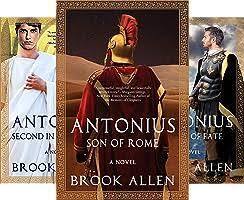 The Antonius Trilogy by Brook Allen
The Antonius Trilogy by Brook AllenBuy Link:
https://www.amazon.com/The-Antonius-Trilogy/dp/B08KWCSMDX
Do you have a favourite time of day to write?
Whew!I still have a day job, that really gets in the way of my writing! Because of that, I’m the beggar who can’t always be the chooser. Whatever time lands in my lap in which there’s no responsibility or time constraint—that’s the time I grab. That being said, I’m not a morning person, so when I have a preference, I do my best work in the afternoon or at night. Someday, once I retire, I can’t wait to stay up writing or reading until 2am! That will be pure Heaven!
If you weren’t an author, what would you be up to?
Haha! I’d be up to a lot more yard-work and housecleaning!
You have been chosen as a member of the crew on the first one-way flight to Mars – you are allowed to bring 5 books with you. What would they be?
A Bible, an unread Sharon Kay Penman novel, two research books on whatever I’m writing on at that time, and a how-to-operate- a-rocket manual. That last one might really come in handy.
Please tell us about your latest published work.
My new release is West of Santillane, and it’s the story of Julia Hancock, who became explorer William Clark’s wife. I live in Virginia, and Julia was a proud Virginian who loved her family and found herself pioneering to the wild and rowdy frontier of St. Louis in 1808. It was a town of fur-trappers, drunken sailors, and loose women. However, Julia made it home, alongside Clark, who had been sent there by Thomas Jefferson to begin an American government, with his friend Meriwether Lewis, Governor of the Territory. It’s a heartwarming tale, oft-times with excitement and tragedy. I hope you’ll consider giving it a read!
WEBSITE: https://www.brookallenauthor.com/
X (TWITTER): https://twitter.com/1BrookAllen
FACEBOOK: https://www.facebook.com/Historical.FictionWriter
GOODREADS: https://www.goodreads.com/author/dashboard?ref=nav_profile_authordash
INSTAGRAM: https://www.instagram.com/brookallen54/
February 14, 2024
Roses for the Dead by Jenny O’Brien: Book Spotlight
A very happy Publication Day to my good friend and fellow Irish author, Jenny O’Brien. Book 2 in the Alana Mack Irish detective series, Roses for the Dead, is out today. The Puppet Maker, book 1, was super, so I’m dying to get stuck into this next instalment.
A Little Bit About the Book …Roses for the Dead by Jenny O’BrienPublication Date 14th February 2024 – Publisher: Storm Publishing
10am: A mother rushes for a train after dropping her daughter at school but is reported missing when she doesn’t return to pick her up.
2.47pm: The same train causes the death of a young woman; her body bound and placed on the tracks.
When Detective Alana Mack discovers the missing mother has vanished from the same train that claimed the life of the young woman, she fears the worst.
A killer is on the loose, targeting women and leaving their broken bodies scattered across Dublin’s Dart train line. The victims appear to have no connection to one another, but their murders bear the same chilling hallmark – identical single red roses left at each of their crime scenes. And that’s not all…
Every trace of the women’s lives has been extinguished from their homes. Their bedding replaced with pristine white sheets, photos of loved ones and precious keepsakes all eradicated.
With little to go on in the sterile environments left by the killer, Alana and her team must desperately try and uncover the link between the women. But when another body is found, this time with a different, rare variety of rose, Alana’s instincts tell her this tiny clue could crack the case open and lead them to the twisted individual.
Then Alana receives a chilling message: ‘Roses are red. Blood is too. One and two are on me. Number three and four are on you.’ The killer is hiding in plain sight and playing a sick game with her. If she doesn’t find them soon, more innocent lives will be taken.
A heart-stopping thriller that will keep fans of Angela Marsons, Ann Cleeves, and Patricia Gibney glued to the pages and racing through Roses for the Dead in one sitting.
Buy Link: https://t.co/JzvPbthdpP
 Book 2: Alana Mack SeriesA Little Bit About Jenny …
Book 2: Alana Mack SeriesA Little Bit About Jenny …Born in Dublin, Jenny O’Brien moved to Wales and then Guernsey, where she tries to find time to write in between working as a nurse and ferrying around 3 teenagers.

In her spare time she can be found frowning at her wonky cakes and even wonkier breads. You’ll be pleased to note she won’t be entering Bake-Off. She’s also an all-year-round sea swimmer.
Jenny is represented by Nicola Barr of The Bent Agency and published by Storm Publishing and HQ Digital (Harper Collins).
You can find out more about Jenny and her books on her blog:
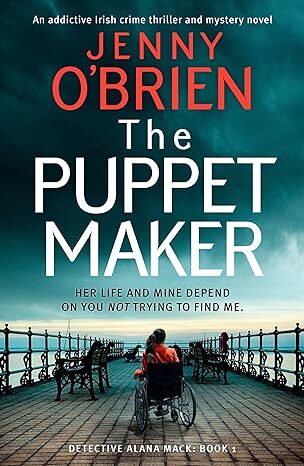 Book 1: Alana Mack Series
Book 1: Alana Mack Series
February 6, 2024
The Low Road by Katharine Quarmby: The Coffee Pot Book Club Blog Tour
Today, I am delighted to host Katharine Quarmby on the Coffee Pot Book Club Blog Tour for her latest release, The Low Road. Katharine has kindly provided an excerpt for your enjoyment. (See below).
You can follow the full tour here:
Tour Schedule Page: https://thecoffeepotbookclub.blogspot.com/2023/12/blog-tour-the-low-road-by-katharine-quarmby.html
The Low Road by Katharine QuarmbyIn 1828, two young women were torn apart as they were sentenced to transportation to Botany Bay. Will they ever meet again?
Norfolk, 1813. In the quiet Waveney Valley, the body of a woman – Mary Tyrell – is staked through the heart after her death by suicide. She had been under arrest for the suspected murder of her newborn child. Mary leaves behind a young daughter, Hannah, who is later sent away to the Refuge for the Destitute in London, where she will be trained for a life of domestic service.
It is at the Refuge that Hannah meets Annie Simpkins, a fellow resident, and together they forge a friendship that deepens into passionate love. But the strength of this bond is put to the test when the girls are caught stealing from the Refuge’s laundry, and they are sentenced to transportation to Botany Bay, setting them on separate paths that may never cross again.
Drawing on real events, The Low Road is a gripping, atmospheric tale that brings to life the forgotten voices of the past – convicts, servants, the rural poor – as well as a moving evocation of love that blossomed in the face of prejudice and ill fortune.
Universal Buy Link: https://books2read.com/u/mg5RAD
An Excerpt from The Low RoadCHAPTER TWENTY-TWO
Trial day. They shake us awake at dawn, command us to hurry, to dress and tidy ourselves. There are twenty of us on trial at the sessions and we line up, file through the corridors. I count seven gates to be locked, unlocked, locked again, until we arrive at last at a great wooden door and stop. Behind it, as it opens, I see a long brick passage, and we pass through it and into the fortress. The Old Bailey. Eight times a year they hold the sessions there, and the death sentences are handed down after the king has considered and confirmed them.
This is the Middlesex Sessions, and the jurymen file in as we stand up straight in the dock and then the judge comes in, Judge Newman Knowlys, and then the clerk intones the date, 10 January 1822, and our trial starts. The staff from the refuge are there and so is Potter. I look for Maria.
Just for a moment I look sideways at Annie. She holds the edge of the dock, her fingers white, and is trembling. I had forgotten that she had been here before, and that last time Mr Haskin had seen her and looked kindly on her and so her sentence had been respited. I see how she gazes on the jury and the judge, perhaps hoping that again she can dodge punishment, but I refuse to do so. I see how the jurymen are crammed in a stall to our right, and how below us are clerks, lawyers and writers. I look up and see a mirror above our heads. I remember talk in our cell of why this is, that the jury can examine our faces, tell whether or not we are telling the truth. I look up at the chandeliers and see that they are shining bright and for some reason wonder that they are shined to such a buff and how a servant must be put on a high ladder to go up there and balance as they polish. The clerk glares at us, tells us to look forward. He reads out the charges. The minute hand on the large clock ticks round twice before he is finished, for the list of items that we stole is long and carefully detailed. He intones at first, then speeds up and gallops through the list.
“They are accused of stealing three gowns, value nine shillings; eight aprons, value four shillings; three remnants of printed calico, value four shillings; six petticoats, value six shillings; three pair of stockings, value one shilling.; three caps, value sixpence; four shifts, value four shillings; one dresser-cloth, value sixpence; two slips of muslin, value one penny; two combs, value three pennies; two handkerchiefs, value two pennies; one shawl, value ninepence; two pair of stays, value one shilling, and two bonnets, value two shillings, the goods of Edward Forster, Stephen Lushington and Peter Martineaux, trustees of the Refuge for the Destitute; and one gown, value two shillings; one bag, value one pence; two gown bodies, value two shillings; two yards of muslin, value one shilling.; one pocket-book, value one pence, and two yards of lace, value one shilling, the goods of Rachel Clements, spinster.”
How far would all that soiled and dirty washing really have got us, I wonder, as he nods, sits down. Where would we be now if Old Ma had come earlier, and we had gone with her?
Charles Haskin is called first, and he gives his name and his title. I see a writer setting down his account in squiggles I do not understand. He does not look at us once, although I steal a glance sideways, see how Annie gazes at him with those great soft eyes, framed by glistening lashes. She must have done this last time to win him over, reminding him of his poor sister. “I am superintendent of the Refuge for the Destitute, in the Hackney Road. I live in the house, and have the charge of it; Tyrell was admitted first, and Simpkins came to the refuge from this place the following April. I commanded Tyrell to have care of Simpkins, but she abused my trust, as did Simpkins. I sent Tyrell away to service, but her mistress returned her. On the tenth of December, between seven and eight o’clock in the evening, they both left the house without notice, and this property was missed. Between eight and nine o’clock the same night, I found them in St George’s Fields, walking in the road. I took a bundle from Tyrell and Simpkins, containing the property belonging to the institution.”
There are no cross-questions, and he leaves the stand. I wonder where Maria is, for she had been there, she should be a witness. I realise that I have missed her, that quiet companionship we shared, our small jokes; that I should have tried so much harder, that I didn’t need to choose between loving Annie and liking my first friend.
Miss Clements comes next. She has been taken in hand and neatened by someone, I can see it, for her hair is tied back in a neat bun and greased down and not one strand falls out as she speaks. “I am bookkeeper and housekeeper to the institution. The prisoners left the house on the tenth of December. Here is a pocket-book and a gown body in the bag. They are mine, among other items; “they were kept in the counting house.” She brings them out, shows them to the jurymen and I wonder, why do they need to see them? Then she bursts out, “Please have mercy on them, the girls, the poor girls,” and the judge hammers down and she leaves the witness box in tears and I find I am crying too. Poor Miss Clements.
Mrs Clark is next; she climbs up to give evidence with a heavy sigh I recognise. She looks at us both and shakes her head.
“I am the matron. The prisoners left unknown to me; part of the property was under my care. I know it to belong to the Society.”
I am called to defend myself. I cannot, will not hurt Maria or Annie. But there is one person I can lay the blame on. I stare at her. She will never have her now, and nor will the Hardings, and so it was worth it. I stand up and I fix the jury with my gaze. I will not beg. I will blame.
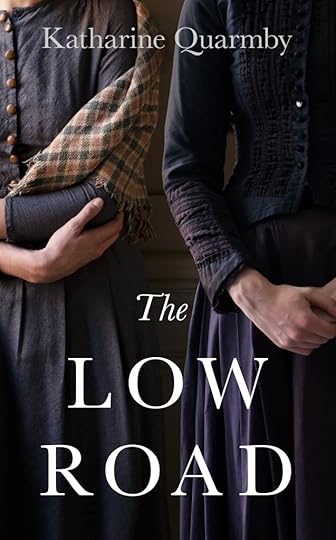
Author Bio:
Katharine Quarmby has written non-fiction, short stories and books for children and her debut novel, The Low Road, is published by Unbound in 2023. Her non-fiction works include Scapegoat: Why We Are Failing Disabled People (Portobello Books, 2011) and No Place to Call Home: Inside the Real Lives of Gypsies and Travellers (Oneworld, 2013). She has also written picture books and shorter e-books.

She is an investigative journalist and editor, with particular interests in disability, the environment, race and ethnicity, and the care system. Her reporting has appeared in outlets including The Guardian, The Economist, The Atlantic, The Times of London, the Telegraph, New Statesman and The Spectator. Katharine lives in London.
Katharine also works as an editor for investigative journalism outlets, including Investigative Reporting Denmark and The Bureau of Investigative Journalism.
Author Links:
Website: https://www.katharinequarmby.com
Twitter: https://twitter.com/KatharineQ
Facebook: https://www.facebook.com/katharinequarmbywriter/
LinkedIn: Katharine Quarmby – Writer, Journalist, Editor – Self-employed | LinkedIn
Instagram: https://www.instagram.com/katharinequarmby_/
Amazon Author Page: https://www.amazon.co.uk/stores/Katharine-Quarmby/author/B004GH8LS6
Goodreads: https://www.goodreads.com/author/show/2082356.Katharine_Quarmby
January 19, 2024
The Beauty Doctor by Elizabeth Hutchison Bernard: The Coffee Pot Book Blog Tour
Media Kit
Today I am delighted to host Elizabeth Hutchison Bernard for the book blog tour for her newest release, The Beauty Doctor. Elizabeth has kindly provided an excerpt for you to enjoy – please see below.
You can follow the full tour here: https://thecoffeepotbookclub.blogspot.com/2023/12/blog-tour-the-beauty-doctor-by-elizabeth-hutchison-bernard.html
THE BEAUTY DOCTOR: A NOVEL by Elizabeth Hutchison BernardAudiobook narrator: Lisa Bozek
A Bone-Chilling Mystery-Suspense-Thriller Set in the Edwardian Era
Finalist, Eric Hoffer Book Award
“Beauty is power,” Dr. Rome told her. “And with enough power, one can achieve anything.”
Straightening noses, trimming eyelids, lifting jowls . . . In the year 1907, his revolutionary beauty surgery is considered daring, perhaps dangerous. Still, women want what Dr. Rome promises. Neither is his young assistant Abigail Platford immune to Dr. Rome’s persuasive charm.
Abigail once dreamed of becoming a doctor, though of a much different sort. That dream ended with her father’s tragic death from a medical error for which she holds herself responsible. Dr. Rome, who proudly displays his medical degree from Johns Hopkins, seems to believe in her. If he were willing to act as her mentor, might there still be a chance to realize her dream of someday becoming a doctor serving New York City’s poor?
But something feels terribly wrong, as though an insidious evil is closing in. Broken promises, lies, and intrigues abound. The powerful are threatening to destroy the weak, and a doctor’s sacred duty hangs in the balance. Abigail no longer knows who to believe; but with Dr. Rome now her mentor and her lover, she desperately wants to trust him.
Even when she discovers that one of their patients has mysteriously disappeared.
From bestselling author Elizabeth Hutchison Bernard, a suspenseful work of historical fiction grounded in the social and moral issues of the Edwardian era in America. Second Edition with Author’s Preface.
Buy Links:
This title is available to read on #KindleUnlimited.
Universal Buy Link: https://books2read.com/u/316BAr
 The Beauty Doctor: An Excerpt
The Beauty Doctor: An ExcerptOn the chance Dr. Rome was still attending to Mr. Kilroy, she lay in wait. He was clearly surprised to find her loitering in front of the Kilroys’ townhome. She explained that she was calling off her engagement and needed to find employment. He seemed interested. It wasn’t until they were sitting across from each other at Café Le Jour on Forty-sixth Street that Abigail began to think she’d made yet another terrible mistake.
“You are a very beautiful young woman,” he said, smiling at her over his coffee cup. “I suppose people tell you that all the time.”
“Not so often, actually.” That he had begun on such a personal note, and with the same overabundance of charm he’d displayed at the Hennessys’ banquet, had an unsettling effect on her. As did his gaze, which was direct and insistent.
“I’m sure you’re only being modest, but you need not be around me. I appreciate beauty for what it is and for the entitlements it brings to those lucky enough to have it.”
“I’ve never been one to think much about entitlements. I was taught that if you desire something, you work for it. Which is why I wanted to speak with you—”
“There are lots of women who work very hard at being beautiful and still they can’t hold a candle to you. I’d even go so far as to say that you, Miss Platford, are the embodiment of everything I hope to achieve for my patients. That’s why you may actually be the perfect one to assist me with my new practice. You see, what I really need,” he said, the excitement in his voice building, “is a foil. A stunningly beautiful foil.”
“A foil?” She wasn’t sure what the word meant, but didn’t like the way it sounded.
“Yes. Someone to make the rounds with me at parties and events, anywhere we can meet women—the kind of women with both the desire and the means to avail themselves of my services.” This was not what she’d expected, nor was it a welcome development. Her purpose in approaching Dr. Rome was a far more serious one than his words implied. She had imagined herself working at his side, much as she had done with her father, helping to put patients at ease, assisting with their care. And though it was not her favorite duty, she would readily have consented to manage his schedule and fulfill the required paperwork if he were to ask her. But this business of attending parties and events—what did it have to do with doctoring?
“You speak of meeting women in need of your services, but surely you plan to take care of men as well. Mr. Kilroy is your patient, isn’t he?”
“For the moment, yes—though that was only a favor. But let me explain.” He took a hasty gulp of his coffee and set down the cup. “I’m about to embark on a new facet of my career, a new field. Transformative surgery. Have you heard of it?”
“I don’t believe I have.”
“Some call it beauty surgery.”
She instantly recalled splashy advertisements she’d seen in the newspapers for practitioners who claimed to specialize in straightening noses, pinning back ears, and plumping up wrinkles with paraffin. At best, such solicitations had struck her as tasteless. At worst … might Dr. Rome be nothing more than a charlatan?
“Oh—you’re a beauty doctor.” The inflection in her voice no doubt came across as somewhat disparaging. She dipped her head, hoping to obscure the visual evidence of her skepticism beneath the plethora of ostrich feathers on the brim of her blue velvet hat.
“Just imagine it for a moment, Miss Platford,” he said, seeming not to have found anything disturbing in her reaction. “Your mere presence by my side would stimulate, in any average woman, an intense longing for beauty; then, arising quite naturally from that, a burning curiosity. With just a hint, she would be eager to learn what I offer in the way of beautifying procedures. That’s how one goes about building a thriving beauty practice. Stimulate the need, offer the solution. Or, if you prefer, think of it this way: You would be helping to enlighten women about advances that can greatly enhance their lives. No different from selling a product. A product that people would certainly buy if they only knew its benefits.”
So, he wanted her to help him sell the concept of beauty surgery to other women? That was not what a doctor does! To take part in such activities would compromise everything she believed in. “Your idea is to use me as a sort of walking advertisement?”
“I wouldn’t put it like that.”
“Forgive me for being blunt, but are you really a doctor?”
He shoved aside his coffee cup, almost knocking it over. “Would I call myself a doctor if I wasn’t one?”
“I don’t mean to offend you. It’s just that I don’t know any other doctors who are engaged in your kind of work.”
“Because no medical school in this country has the foresight to embrace transformative surgery. That’s why it was necessary for me to receive advanced training in Europe. I returned from Paris only recently.”
“But you did train in medicine? Here in America?”
“Certainly, but the typical doctor’s training only goes so far. The medical establishment is very set in its ways. It resists anything that might challenge the status quo. And that is exactly what transformative surgery does. The social implications are immense. It represents possibly the greatest force for the empowerment of women in all of human history.”
“Empowerment of women?” Despite her disappointment, she had to smile. “I’m sorry, but I don’t see what your transformative surgery could have to do with the movement for women’s rights.”
“Maybe you’ve never thought of it this way, but beauty is power,” Dr. Rome said, with the calm certainty of a man who knows he speaks the truth. “And with enough power, Miss Platford, a woman can achieve anything.”
Author Bio:
Elizabeth Hutchison Bernard is the author of bestselling historical novels. Her 2023 release, Sisters of Castle Leod, is an Amazon Kindle #1 Bestseller (Historical Biographical Fiction, Historical Literary Fiction), winner of the 2023 Maxy Award for Historical and Adventure Fiction, and an Editors’ Choice of the Historical Novel Society. Her biographical novel Temptation Rag (2018) was hailed by Publishers Weekly as a “resonant novel . . . about the birth and demise of ragtime . . . in which romance and creative passions abound.” Elizabeth’s 2017 historical mystery-suspense-thriller, The Beauty Doctor, was a finalist for the prestigious Eric Hoffer Book Award. The book’s re-release (Jan. 4, 2024) features a stunning new cover and an Author Preface with insights into social and moral issues of the Edwardian era that frame this shocking fictional story set in the early days of cosmetic surgery. Before becoming a full-time author, Elizabeth was executive editor of an international aesthetic surgery journal, and senior consultant to the National Cosmetic Network in conjunction with Johns Hopkins University’s plastic surgery educational program. Learn more about Elizabeth and her books at http://www.EHBernard.com.
Author Links:
Website: https://www.ehbernard.com
Twitter: https://www.X.com/EHBernardAuthor
Facebook: https://www.facebook.com/EHBernardAuthor
Instagram: https://www.instagram.com/EHBernardAuthor
Amazon Author Page: https://www.amazon.com/stores/Elizabeth-Hutchison-Bernard/author/B072N681MZ
Goodreads: https://www.goodreads.com/author/show/16953486.Elizabeth_Hutchison_Bernard
January 11, 2024
The Dream Collector “Sabrine & Sigmund Freud: The Coffee Pot Book Blog Tour
Today, I am delighted to host Rw Meek on the blog tour for his new release, The Dream Collector “Sabrine & Sigmund Freud”. Please take a look at the excerpt below.
You can follow the full tour here: https://thecoffeepotbookclub.blogspot.com/2023/12/blog-tour-the-dream-collector-by-rw-meek.html
The Dream Collector “Sabrine & Sigmund Freud” (Book 1) by R.w. MeekThe Dream Collector immerses the reader into the exciting milieu of late 19th Century Paris when art and medicine were in the throes of revolution, art turning to Impressionism, medicine turning to psychology. In 1885, Julie Forette, a self-educated woman from Marseilles, finds employment at the infamous Salpêtrière, hospital and asylum to over five thousand disabled, demented and abandoned women, a walled city ruled by the famed neurologist and arrogant director, Dr. Jean-Martin Charcot.
Julie Forette forms a friendship with the young, visiting intern Sigmund Freud who introduces her to the altering-conscious power of cocaine. Together they pursue the hidden potential of hypnotism and dream interpretation. After Freud receives the baffling case of the star hysteric, Sabrine Weiss, he is encouraged by Julie to experiment with different modes of treatment, including “talking sessions.” Their urgent quest is to find a cure for Sabrine, Princess of the Hysterics, before Dr. Charcot resorts to the radical removal of her ovaries.
In Paris, Julie finds a passion for the new art emerging, Impressionism and Post-Impressionism, and forms friendships with the major artists of the period, including Pissarro, Monet, and Degas. Julie becomes intimately involved with the reclusive Cezanne only to be seduced by the “Peruvian Savage” Paul Gauguin. Julie is the eponymous ‘Dream Collector’ collecting the one unforgettable, soul-defining dream of the major historical figures of the period.
Praise for The Dream Collector:
“Meek never fails to stun and impress with his evocation of scenes and events, of sights and dialogue, and of peoples’ reactions to them.”
~ HFC Reviews
Universal Buy Link: https://books2read.com/u/4jE52j
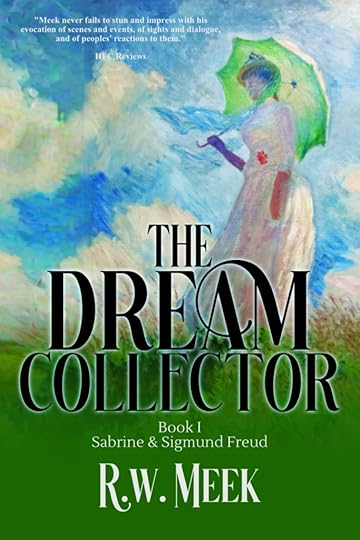 Excerpt:
Excerpt:The Dream Collector
The decipherable power of the Rosetta Stone intrigued me. How for millenniums the strange hieroglyphs painted on Egyptian tomb walls were considered unreadable, a mystery buried with the Pharaohs, until the Rosetta Stone supplied the code, and inserted meaning to what seemed only fanciful imaginings. I kept wondering if dreams, whether laughable, weird or lunatic, could be deciphered. What if dreams were, like hieroglyphics, nothing less than pictograms, a parade of symbols that, when gathered together, told hidden stories? Suppose the scenes in dreams, which appeared disconnected, vague and absurd, were quite rational—if you had a Rosetta Stone to interpret them.
So my new experiment came to be: collecting dreams.
Author Bio: R.w. Meek
R.w. MeekR.w. Meek has a Master’s degree in Art History from the American University in Washington, D.C., his areas of expertise are Impressionism and Post-Impressionism, with a particular interest in Vincent van Gogh. He has interned and conducted tours at the National Museum of American and the National Gallery of Art. In 2022 and 2023 five of his chapter excerpts from his soon to be published novel “The Dream Collector” were either finalists or published in various literary journals. The author has also won the Palm Beach Book Festival Competition for “Best Writer in Palm Beach’ his manuscript judged by a panel of NYT Best Selling authors. “The Dream Collector” also received gold and silver medals in the Historical Fiction Company literary contest and earned runner-up for the “Best Historical Fiction Novel’ of 2022.
The author was born in Baltimore, adventured in Europe for many years, and recently moved from Delray Beach, Florida to Santa Clarita, California. His wife is a psychologist, sculptress, playwright and stand-up story teller. His daughter Nora is a story board artist in the animation world and resides in Hollywood, California. His favorite writers are Dostoevsky, John Fowles, and Antoine de Saint-Exupery.
Author Links:
Website: https://www.ronmeekauthor.com
Facebook: https://www.facebook.com/profile.php?id=100010220437381
December 14, 2023
The Fortune Teller of Kathmandu by Ann Bennett: The Coffee Pot Book Club Blog Tour
Today, I am delighted to host Ann Bennett for her book blog tour for The Fortune Teller of Kathmandu. Ann has been kind enough to include an excerpt from the book (see below).
You can follow the full tour here: https://thecoffeepotbookclub.blogspot.com/2023/11/blog-tour-the-fortune-teller-of-kathmandu-by-ann-bennett.html
The Fortune Teller of Kathmandu by Ann BennettA sweeping wartime tale of secrets and love, mystery and redemption, moving from the snow-capped Himalayas to the steamy heat of battle in the Burmese jungle.
Perfect for fans of Dinah Jeffries, Victoria Hislop and Rosie Thomas.
Hampshire, UK, 2015. When Chloe Harper’s beloved grandmother, Lena dies, a stranger hands her Lena’s wartime diary. Chloe sets out to uncover deep family secrets that Lena guarded to her grave.
Darjeeling, India, 1943, Lena Chatterjee leaves the confines of a strict boarding school to work as assistant to Lieutenant George Harper, an officer in the British Indian Army. She accompanies him to Nepal and deep into the Himalayas to recruit Gurkhas for the failing Burma Campaign. There, she discovers that Lieutenant Harper has a secret, which she vows never to reveal.
In Kathmandu, the prophesy of a mysterious fortune teller sets Lena on a dangerous course. She joins the Women’s Auxiliary Service Burma (the Wasbies), risking her life to follow the man she loves to the front line. What happens there changes the course of her life.
On her quest to uncover her grandmother’s hidden past, Chloe herself encounters mystery and romance. Helped by young Nepalese tour guide, Kiran Rai, she finds history repeating itself when she is swept up in events that spiral out of control…
“What a wonderful book… I loved it. The dual time lines were delineated to perfection… the settings were perfectly rendered.” Advance Reader.
Buy Links:
This title is available to read with #KindleUnlimited.
Universal Buy Link: https://mybook.to/tftok
 An Excerpt from The Fortune Teller of Kathmandu
An Excerpt from The Fortune Teller of KathmanduPrologue
There was little natural light in the cell-like room, tucked away in the back of an ancient building in the maze of narrow, cobbled streets in the heart of old Kathmandu. Despite that, Devisha had the sense that daylight was fading quickly outside, and that darkness would soon envelop the neighbourhood.
It had been quiet that day. But the usual mix of people had made their way through the backstreets and alleyways to her door, crossed the outer chamber lit only by flickering candles, and drawn back the velvet curtain that divided Devisha’s alcove from the chamber. As they did every day, they had sat down opposite her with their timid, hopeful faces, extended their palms across the table, raised their eyes tentatively to hers before she dropped her gaze to read the future mapped out in their lines. The Line of Life, the Line of Fate, the Line of Heart, the Line of Fortune. The mounts of Jupiter, Saturn, Apollo, Mercury and Venus. Devisha knew every permutation of every line intimately, as well as what they signified.
Today had been much like every other day. There had been the young daughter of a rice farmer from Nagarkot who had arrived with her mother. They’d walked the length of the Kathmandu valley to Devisha’s rooms. They wanted to be sure that the girl’s chosen betrothed was auspicious, and to get Devisha’s advice on the best date to set the wedding. There had been the old, stooping carpenter from Bodinath, his brow furrowed with worry. His business was failing as well as his health. He’d asked if things would pick up in the future. Then, there had been the middle-aged woman from Thamel who’d already lost three babies in childbirth. With a pleading look in her eyes, she’d wanted to know if the one she was now carrying would survive.
All Devisha could tell them was what she saw in their palms. She could usually see, as soon as she turned a hand over in her own, peered at the palm and traced the lines with her own fingers. Their futures played out in her mind. She would try to tell them exactly what she saw, what they craved to know.
It wasn’t always easy living with the gift that had been passed to her down the generations. She’d learned it at her mother’s knee and her mother from her grandmother before her. To witness the pain in people’s faces when she told them what she could see was sometimes hard to bear. Their heartache would often become her own. She knew she would be thinking about the woman from Thamel long into the night. But in amongst the pain was joy too, joy and light and hope for the future. She’d foreseen that the rice-farmer’s daughter’s marriage would be happy and prosperous, and that she would have a long, rich life, filled with love and laughter.
With a sigh, Devisha got up from her chair. It was time to get ready to go home. But as she held back her veil and stooped to blow out the first candle, she heard the click and creak of the outer door. Then came footsteps. Someone was walking slowly across the chamber towards her. The footsteps stopped and, as often happened, the newcomer hesitated for a couple of seconds before pulling back the curtain and peeping through.
The face of a stranger appeared in the flickering candlelight. A young woman, with soft dark hair and pale skin. She looked different to most of Devisha’s customers. She wasn’t local, and in this hidden quarter, it was rare to see a foreigner. Although the newcomer had Indian features, she was wearing western clothes. Devisha noticed the scepticism in the woman’s narrowed eyes, but there was a hint of curiosity, and a sort of yearning there too.
Devisha quickly sat down and beckoned the young woman forward. ‘Don’t be afraid,’ she said. ‘Please, come in. Sit down. Give me your hand.’
The girl’s eyes flickered hesitantly, darting around the room, taking in the smoking candles, the incense and the wall hangings. Then she took a couple of steps forward, sat down in the chair opposite and extended her right hand across the red tablecloth.
Devisha took the soft, manicured hand in her own, studied it for a few seconds. Her eyes widened and she stifled a gasp.
This was unusual indeed. There was a lot to see in this palm. There was everything there she’d expected from such a subject, but there was more. Much, much more.
Devisha narrowed her eyes and peered closer concentrating deeply. Whatever it was, was elusive. She traced the Line of Luna with her long, painted fingernail, letting it rest briefly on the Mount of Mercury.
This young woman would be tested, that was clear. But she was strong too. Stronger than she looked. There was something more there though… something dark, something troubling. Something that even Devisha couldn’t fathom, not straightaway. She bent forward, her many necklaces clanking against the table, and looked closer.
Author Bio:

Ann Bennett is a British author of historical fiction. She was born in Pury End, a small village in Northamptonshire, UK and now lives in Surrey. Her first book, Bamboo Heart: A Daughter’s Quest, was inspired by researching her father’s experience as a prisoner of war on the Thai-Burma Railway. Bamboo Island: The Planter’s Wife, A Daughter’s Promise and Bamboo Road:The Homecoming, The Tea Panter’s Club and The Amulet are also about the war in South East Asia, which together with The Fortune Teller of Kathmandu make up the Echoes of Empire Collection.
Ann is also author of The Runaway Sisters, bestselling The Orphan House, The Forgotten Children and The Child Without a Home, published by Bookouture.
The Lake Pavilion, The Lake Palace, both set in British India in the 1930s and WW2, and The Lake Pagoda and The Lake Villa, set in French Indochina during WW2, make up The Oriental Lake Collection.
Ann is married with three grown up sons and a granddaughter and works as a lawyer. For more details please visit www.annbennettauthor.com.
Author Links:
Website: https://www.annbennettauthor.com
Twitter: https://twitter.com/annbennett71
Facebook: https://www.facebook.com/annbennettauthor
Instagram: https://www.instagram.com/annbennettauthor/
Amazon Author Page UK: https://www.amazon.co.uk/-/e/B00D21SJ7A
Goodreads: https://www.goodreads.com/author/show/1951323.Ann_Bennett
December 6, 2023
How to Dress Like a Tudor: Book Spotlight with the Coffee Pot Book Club
Today, I am delighted to host Judith Arnopp for her non-fiction book spotlight tour for How to Dress Like a Tudor. Judith is passionate about the Tudor period and really knows her stuff, so this is a must-have for any historical fashion and reenactment fans.
You can follow the full tour here: https://thecoffeepotbookclub.blogspot.com/2023/11/blog-tour-how-to-dress-like-a-tudor-by-judith-arnopp.html
How to Dress Like a Tudor by Judith ArnoppHave you ever hankered to dress like a Tudor lord or lady, or perhaps you prefer the status of goodwife, or costermonger, or even a bawd?
For beginner historical reenactors, the path to authenticity can be bewildering and sometimes intimidating. Judith Arnopp uses her own experience, both as a historian and a medieval/Tudor lady, to make your own journey a little easier.
The author traces the transition of fashion from the relatively subtle styles popular at the court of Henry VII, through the carefully constructed royal grandeur of Henry VIII, Edward VI, and Mary I to the pinnacle of majesty and splendid iconography of Elizabeth I.
In contrast to the magnificence of court come the ordinary folk who, subject to sumptuary laws and regulations, wore garments of a simpler cut and cloth – a strata of society that formed the back bone of Tudor England.
This brief history of 16th century fashion examines clothing for both rich and poor, adult and child, and offers tips and tricks on how to begin to sew your first historically inspired garment, this book is aimed at helping the beginner learn How to Dress like a Tudor.
Buy Link:
Universal Buy Link: mybook.to/howtodress
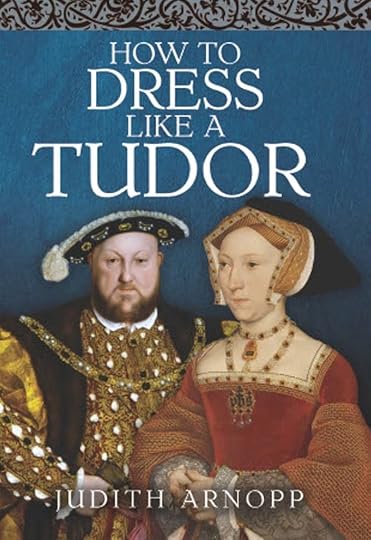 Author Bio:
Author Bio:
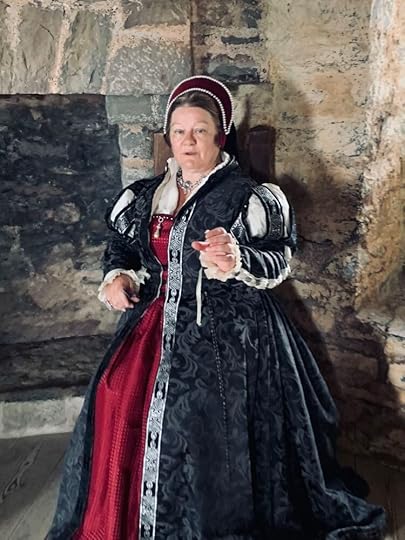
Judith writes historical fiction set during the late medieval and Tudor period. Her usual focus is on the women who lived close to the monarch, women like Margaret Beaufort, Elizabeth of York and Mary Tudor but more recently has been writing from the perspective of Henry VIII himself. Her books are on Kindle, Audible and Paperback.
You can find her fiction books here: http://author.to/juditharnoppbooks
She also writes non-fiction, her work featuring in many anthologies and online magazines. Her latest non-fiction, How to Dress like a Tudor, published by Pen & Sword Books is available now.
Judith is a founder member of a reenactment group The Fyne Company of Cambria, and began making Tudor costumes for herself, her husband, John, and other members of the group. It was this that inspired How to Dress like a Tudor and she hopes to write more non-fiction Tudor history in the future.

Author Links:
Website: http://www.judithmarnopp.com
Twitter: https://twitter.com/JudithArnopp
Facebook: https://www.facebook.com/thetudorworldofjuditharnopp
LinkedIn: www.linkedin.com/in/judith-arnopp-ba999025
Instagram: https://www.instagram.com/tudor_juditharnopp/
Bluesky: https://bsky.app/profile/jarnopp.bsky.social
Book Bub: https://www.bookbub.com/profile/judith-arnopp
Amazon Author Page: https://www.amazon.co.uk/Judith-Arnopp/e/B003CGLWLA/
Goodreads: https://www.goodreads.com/author/show/4088659.Judith_Arnopp



